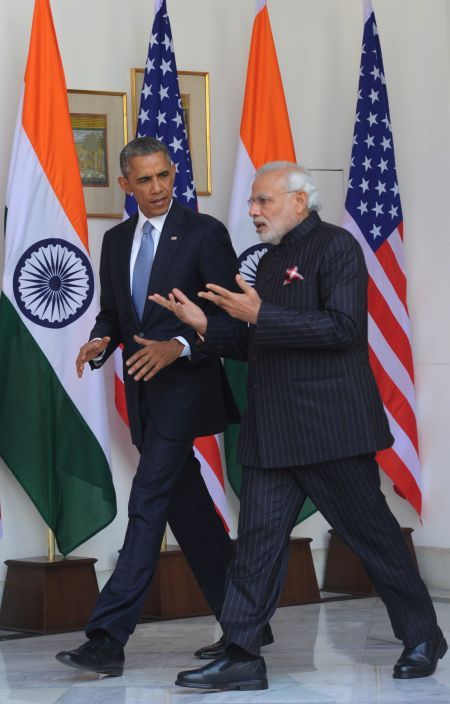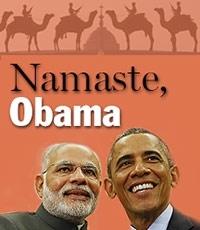
India and the United States broke the seven-year-old logjam in operationalising their landmark civil nuclear agreement with an announcement that "the deal is done" after talks between President Barack Obama and Prime Minister Narendra Modi.
In what Obama called a "breakthrough", the two sides have resolved key hurdles pertaining to the liability of suppliers of nuclear reactors in the event of an accident and the tracking of fuel supplied by the US and other countries for its proposed nuclear plants. "We have broken the logjam of the past few years. We have reached an agreement. The deal is done," Foreign Secretary
Sujatha Singh announced after extended discussions between Obama and Modi lasting more than three hours.
The foreign secretary said that assurances are given to the US side on both the liability clause and tracking issues. "The liability provisions and administrative arrangements finalised under the 123 act (tracking) are consistent with our bilateral legal arrangements and contracts and IAEA safeguards and international laws and obligations," Singh said.
India and the United States on Sunday reached a breakthrough by agreeing on commercial cooperation and decided to take defence cooperation to a new level including on upgrading domestic defence industry and advanced technologies.
The contours of the operationalisation of the nuclear deal, which has been in limbo for the last seven years, were not immediately available, although President Barack Obama described it as a "breakthrough".
The deal on nuclear cooperation and other areas was clinched between Prime Minister Narendra Modi and Obama after discussions spread over three hours at the delegation level as well as one-on-one chat besides a tete-a-tete on the lawns of the Hyderabad House reflecting the warm personal chemistry between the two leaders.
In his opening remarks at the joint media interaction, Modi disclosed that on the nuclear deal the two countries "are moving towards commercial cooperation, consistent with our law, our international obligations and technical and commercial viability."
At the outset, both the leaders said they were committed to deepening relations between the two countries and the fact that Obama is the first US president to be the chief guest at the Republic Day celebrations and also the first to visit India twice were signs of the growing relations.
"In the last few months, I see new excitement and confidence in this relationship. I see renewed energy in our engagement. I thank you for your leadership and for setting the tone last September.
"The civil nuclear agreement was the centrepiece of our transformed relationship, which demonstrated new trust. It also created new economic opportunities and expanded our option for clean energy.”
"In the course of the past four months, we have worked with a sense of purpose to move it forward. I am pleased that six years after we signed our bilateral agreement, we are moving towards commercial cooperation, consistent with ourlaw, our international legal obligations, and technical and commercial viability," Modi said.
It was not known how the two countries have overcome the issues of liability clause in the Civil Nuclear Damage Law over which the US reactor manufacturers have serious reservations.
The US is also believed to insisting on tracking fuel supplies, even from third countries, to the reactors their suppliers will be building in India. New Delhi is said to be opposing such a condition as being intrusive and would subject itself only to International Atomic Energy Agency safeguards.
On the insurance liability clause, India has been telling the US that it will build a pool that will indemnify American reactor builders against liability in case of an accident. "Today, we achieved a breakthrough on two issues that were holding up our ability to advance our civil nuclear cooperation and we are committed to moving towards full implementation," Obama said in his remarks.
"This is an important step that shows how we can work together to elevate our relationship," he said.
Modi said Obama has also assured him of strong US efforts in support of India's full membership of the four international export control regimes at the earliest. "Today, we have also decided to take our growing defence cooperation to a new level. We have agreed, in principle, to pursue co-development and co-production of specific advanced defence projects.” "These will help upgrade our domestic defence industry; and expand the manufacturing sector in India. We will also explore cooperation in other areas of advanced defence technologies," he said.
On terrorism, the prime minister said it remains a principal global threat taking on a new character even as existing challenges persist. "We agreed that we need a comprehensive global strategy and approach to combat with it. There should be no distinction between the terrorist groups. Every country must fulfil its commitments to eliminate terrorists safe havens and bring terrorists to justice," he said.
Modi said the two countries will deepen their bilateral security cooperation against terrorist groups and further enhance counter-terrorism capabilities including in the area of technology.
Touching on regional cooperation, Modi said the two countries renewed their commitment to deepen cooperation to advance peace, stability, prosperity in Asia Pacific and Indian Ocean region which is critical for the future of the two countries and the world.
Modi said they also discussed working on how to help in the transformation of Afghanistan, apparently after complete withdrawal of the US troops.
Obama said both the countries are going to be strong and reliable partners for people of Afghanistan.
The two leaders said they have decided to scale up their economic relationship including holding talks in future on a bilateral investment treaty.
Modi said India and the US will also restart discussions on a social security agreement which is important for the hundreds of thousands of Indian professionals working in the US.
The White House said on Sunday night that the understanding on the civil nuclear programme resolves the US concerns on both tracking and liability. "In our judgement, the Indians have moved sufficiently on these issues to give us assurances," US Ambassador to India Richard Verma told American journalists.
According to Rhodes, it will still be for the US companies to assess the market and decide whether to partake in India's nuclear programme. Neither country needed to take legislative action to complete the agreements reached between the two leaders.
The nuclear deal was the centrepiece of Obama-Modi discussions given its contentious nature but the two leaders reached understanding on a number of other areas including defence.
Obama said the US and India have made progress on defence partnership and decided to renew the framework agreement for 10 more years.
"Today, we have also decided to take our growing defence cooperation to a new level. We have agreed, in principle, to pursue co-development and co-production of specific advanced defence projects.”
"These will help upgrade our domestic defence industry; and expand the manufacturing sector in India. We will also explore cooperation in other areas of advanced defence technologies," Modi said.
Rediff recommends:
- #NamasteObama: Top moments from Day 1
- 'I wasn't nervous:' Wing Commander Pooja Thakur
- How Modi made Obama feel special












 © 2025
© 2025